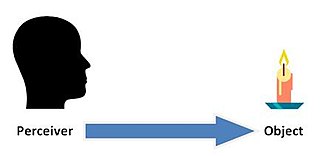Related Research Articles
In analytic philosophy, anti-realism is the position that the truth of a statement rests on its demonstrability through internal logic mechanisms, such as the context principle or intuitionistic logic, in direct opposition to the realist notion that the truth of a statement rests on its correspondence to an external, independent reality. In anti-realism, this external reality is hypothetical and is not assumed.
Irrealism is a term that has been used by various writers in the fields of philosophy, literature, and art to denote specific modes of unreality and/or the problems in concretely defining reality. While in philosophy the term specifically refers to a position put forward by the American philosopher Nelson Goodman, in literature and art it refers to a variety of writers and movements. If the term has nonetheless retained a certain consistency in its use across these fields and would-be movements, it perhaps reflects the word's position in general English usage: though the standard dictionary definition of irreal gives it the same meaning as unreal, irreal is very rarely used in comparison with unreal. Thus, it has generally been used to describe something which, while unreal, is so in a very specific or unusual fashion, usually one emphasizing not just the "not real," but some form of estrangement from our generally accepted sense of reality.

The problem of universals is an ancient question from metaphysics that has inspired a range of philosophical topics and disputes: "Should the properties an object has in common with other objects, such as color and shape, be considered to exist beyond those objects? And if a property exists separately from objects, what is the nature of that existence?"

The world is the totality of entities, the whole of reality, or everything that exists. The nature of the world has been conceptualized differently in different fields. Some conceptions see the world as unique, while others talk of a "plurality of worlds". Some treat the world as one simple object, while others analyze the world as a complex made up of parts.
Moral relativism or ethical relativism is used to describe several philosophical positions concerned with the differences in moral judgments across different peoples and cultures. An advocate of such ideas is often referred to as a relativist.

Hilary Whitehall Putnam was an American philosopher, mathematician, computer scientist, and figure in analytic philosophy in the second half of the 20th century. He contributed to the studies of philosophy of mind, philosophy of language, philosophy of mathematics, and philosophy of science. Outside philosophy, Putnam contributed to mathematics and computer science. Together with Martin Davis he developed the Davis–Putnam algorithm for the Boolean satisfiability problem and he helped demonstrate the unsolvability of Hilbert's tenth problem.
Pluralism is a term used in philosophy, referring to a worldview of multiplicity, often used in opposition to monism or dualism. The term has different meanings in metaphysics, ontology, epistemology and logic. In metaphysics, it is the view that there are in fact many different substances in nature that constitute reality. In ontology, pluralism refers to different ways, kinds, or modes of being. For example, a topic in ontological pluralism is the comparison of the modes of existence of things like 'humans' and 'cars' with things like 'numbers' and some other concepts as they are used in science.

In philosophy of perception and epistemology, naïve realism is the idea that the senses provide us with direct awareness of objects as they really are. When referred to as direct realism, naïve realism is often contrasted with indirect realism.

Henry Nelson Goodman was an American philosopher, known for his work on counterfactuals, mereology, the problem of induction, irrealism, and aesthetics.
Philosophical realism—usually not treated as a position of its own but as a stance towards other subject matters— is the view that a certain kind of thing has mind-independent existence, i.e. that it exists even in the absence of any mind perceiving it or that its existence is not just a mere appearance in the eye of the beholder. This includes a number of positions within epistemology and metaphysics which express that a given thing instead exists independently of knowledge, thought, or understanding. This can apply to items such as the physical world, the past and future, other minds, and the self, though may also apply less directly to things such as universals, mathematical truths, moral truths, and thought itself. However, realism may also include various positions which instead reject metaphysical treatments of reality altogether.
Bastiaan Cornelis van Fraassen is a Dutch-American philosopher noted for his contributions to philosophy of science, epistemology and formal logic. He is a Distinguished Professor of Philosophy at San Francisco State University and the McCosh Professor of Philosophy Emeritus at Princeton University.
The philosophy of testimony considers the nature of language and knowledge's confluence, which occurs when beliefs are transferred between speakers and hearers through testimony. Testimony constitutes words, gestures, or utterances that convey beliefs. This definition may be distinguished from the legal notion of testimony in that the speaker does not have to make a declaration of the truth of the facts.
Philosophy is the study of general and fundamental problems concerning matters such as existence, knowledge, values, reason, mind, and language. It is distinguished from other ways of addressing fundamental questions by being critical and generally systematic and by its reliance on rational argument. It involves logical analysis of language and clarification of the meaning of words and concepts.
Metaepistemology is the branch of epistemology and metaphilosophy that studies the underlying assumptions made in debates in epistemology, including those concerning the existence and authority of epistemic facts and reasons, the nature and aim of epistemology, and the methodology of epistemology.
Irrealism has two main meanings:
Factual relativism argues that truth is relative. According to factual relativism, facts used to justify claims are understood to be relative and subjective to the perspective of those proving or falsifying the proposition.

Fiction theory is a discipline that applies a form of possible world theory to literature. Drawing on concepts found in related theories and psychological ideas such as Parasocial interaction (PSI) and Fictionalism, theorists of fiction study the relationships between perceived textual worlds and reality outside the text. Thus, the primary principle of fiction theory is that the relationships between the speculative nature of fiction and the actual world in which we live are complicated. This further suggests that perceived truths born out of fiction worlds develop a sense of coherency in which they maintain a sense of realism. As a result, this theory offers alternate ways of exploring and asking questions about relations between the fictitious and the actual world.
Epistemology or theory of knowledge is the branch of philosophy concerned with the nature and scope (limitations) of knowledge. It addresses the questions "What is knowledge?", "How is knowledge acquired?", "What do people know?", "How do we know what we know?", and "Why do we know what we know?". Much of the debate in this field has focused on analyzing the nature of knowledge and how it relates to similar notions such as truth, belief, and justification. It also deals with the means of production of knowledge, as well as skepticism about different knowledge claims.

Catherine Z. Elgin is a philosopher working in epistemology and the philosophies of art and science. She is currently a professor of philosophy of education at the Graduate School of Education at Harvard University.

The Roots of Reference is a 1974 book by the philosopher Willard Van Orman Quine, in which the author expands on his earlier concepts about the inscrutability of reference and examines problems with traditional empiricism, arguing for a naturalized epistemology based on holism.
References
- Goodman, N. (1977) [1951]. The Structure of Appearance (3rd ed.). D. Reidel. ISBN 9789027707734.
- Goodman, N. (1978). Ways of Worldmaking . Indianapolis: Hackett. ISBN 978-0-915144-51-8.
isbn:0915144514.
- Goodman, N. (1983). Of Mind and Other Matters . Harvard University Press. ISBN 9780674631250.
- Goodman, N. (1984) [1976]. Languages of Art (2nd ed.). Indianapolis: Hackett. ISBN 978-0-915144-34-1.
- Goodman, N.; Elgin, C.Z. (1988). Reconceptions in Philosophy & Other Arts & Sciences. London: Routledge. ISBN 978-0-415-04886-6.
- McCormick, P.J., ed. (1996). Starmaking: Realism, Anti-Realism and Irrealism. Cambridge, Massachusetts: The MIT Press. ISBN 978-0-585-02120-1.
- Elgin, C.Z., ed. (1997). The Philosophy of Nelson Goodman, Volume 1: Nominalism, Constructivism, and Relativism in the Work of Nelson Goodman. New York and London: Garland. ISBN 978-0-8153-2609-0.
- Elgin, C.Z., ed. (1997). The Philosophy of Nelson Goodman, Volume 4: Nelson Goodman's Theory of Symbols and Its Applications. New York and London: Garland Publishing Inc. ISBN 978-0-8153-2612-0.